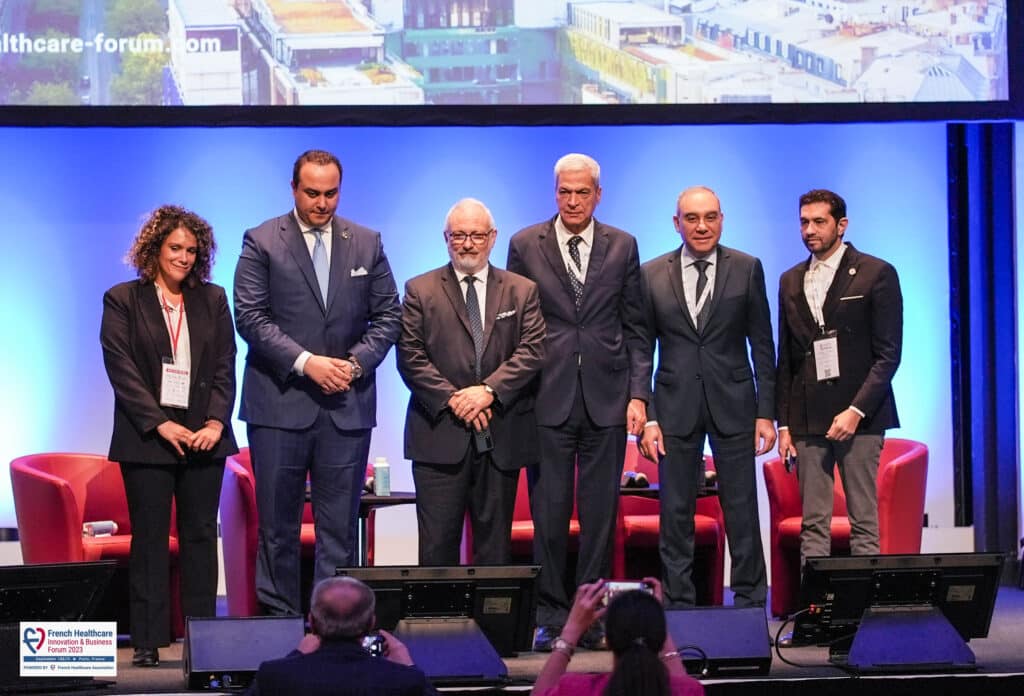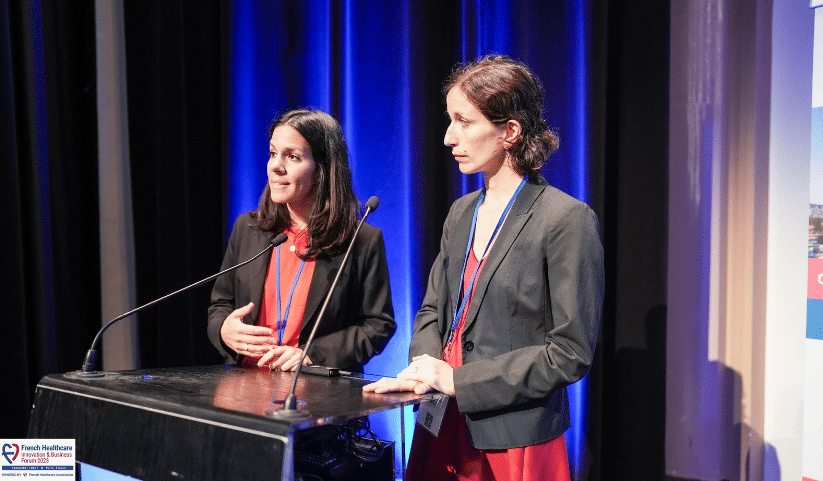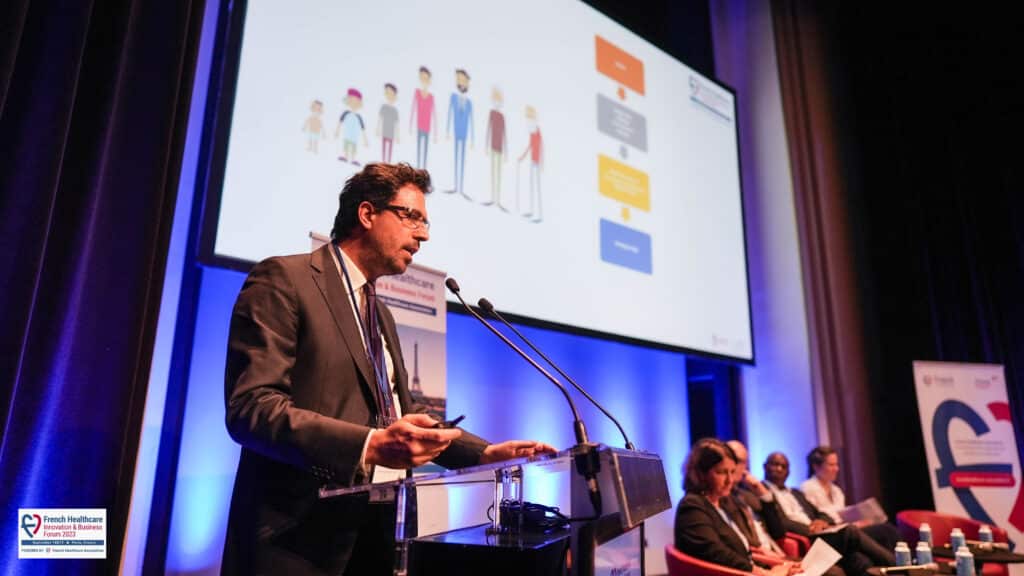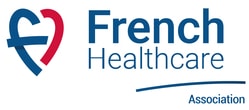You were unfortunately unable to attend all the conferences at the 2023 edition of our French Healthcare Innovation & Business Forum ? Here is a retrospective of the conferences and speeches held during the event.
To better understand international healthcare issues and challenges, particularly in certain key markets, a number of themed conferences and country presentations were held during the second edition of the French Healthcare Innovation & Business Forum.
During the themed conferences, several prestigious speakers shared their knowledge, innovations and objectives surrounding a range of key themes, providing food for thought for the Forum’s numerous attendees. They provided much expertise in a variety of fields, with the conferences aiming to guide them in their investments and in their understanding of the sector’s future prospects.
The conferences alone fulfilled several of the Forum’s objectives, including helping to improve access to quality healthcare worldwide, identifying current and incoming challenges in healthcare, creating synergies to find appropriate responses, and of course generating export opportunities for French companies, especially for the members of the French Healthcare Association. .
Discover here a review of what was presented during these rich times of exchange.

Egyptian French cooperation in the field of Cancer : an example of success
Speakers :
- Rémi Thiollet, Head of International Affairs, Institut Gustave Roussy,
- Dr. Ahmed Morsi, Executive Director of the High Committee and National Program for Women’s Health at the Egyptian Ministry of Health and Population.

Context :
Egypt is currently promoting an ambitious program for its healthcare system, gradually allocating spending to a universal, centralized system in the making. Egyptians’ health is steadily improving, but the population is nonetheless aging. What’s more, it suffers from a problem that has been well known in Western societies for the past 30 years: the development of non-communicable diseases (heart disease, cancer, diabetes, chronic respiratory illnesses, etc.).
A major campaign for cancer prevention, detection and remission
Over the past four years, the Egyptian government has been supported by the Institut Gustave Roussy, a European leader in the fight against cancer. The aim is to implement a modern prevention campaign for the detection, prevention and treatment of breast cancer. This is made possible by actively working to reduce mortality among stage 3 and 4 cancer patients, and to increase prevention among stage 1 and 2 patients.
The Gustave Roussy Institute and the Egyptian delegation presented us with the already very positive results of this campaign: over 40 million patient visits recorded, with 20 million women already monitored and cared for. 60% of monitored cancers are at stage 1 or 2, compared with just 20% at the start of the campaign.
The campaign is therefore a great success, allowed by the combination of practical and theoretical knowledge mobilized by the specialized institute, and by a strong political will coupled with consequential financial support from Egyptian decision-makers. This success was also carried out thanks to to the high qualifications of the Egyptian medical staff.
During a question-and-answer session, Dr. Morsi reiterated Egypt’s determination to continue cooperating with France in this field, notably with the help of the Forum. Now that the processes of collaboration have been confirmed between the country’s players and French organizations, Egypt is ready to go further in this healthcare development, recalling that “alone we go faster, but together we go further”.
Fighting undernutrition in the care pathway of vulnerable populations
Speakers :
- Alice Pieret – Business Developer – Health Nutrition, Nutriset
- Julie Saltel, Project Manager in France, Nutriset

Context :
Nutriset was founded in 1986 by Michel Lescanne in Normandy, and has remained an independent family business ever since, despite its strong growth. Its ambition is to enable everyone, especially the most vulnerable, to access better nutritional practices and improve their standard of living accordingly. The company is entirely dedicated to the research, production and distribution of nutritional solutions, designed to reinforce the impact of health programs already run by governments, the United Nations or NGOs.
The Nutriset group’s mission is to combat under-nutrition through the development of nutritional supplements. The group has a strong presence in Africa, India, South-East Asia and Latin America.
Nutriset’s response to the current and emerging challenges of global nutrition and malnutrition
Having first targeted children, then pregnant and breast-feeding women, Nutriset is now faced with the modern challenges of nutrition, as the demographic groups affected by under-nutrition and malnutrition have multiplied in recent years. The next challenge is to get involved with populations affected by undernutrition because of their age or certain pathologies. These types of deficiencies affect every civilization on the planet and, contrary to popular belief, not only in the poorest countries. In France alone, for example, 2 million people suffer from this form of undernutrition, with an over-representation among the elderly.
Undernutrition drastically increases the need for access to healthcare in the countries affected, making it a perfectly legitimate investment, especially as it implies :
- An average increase in healthcare costs of between 45 and 102%.
- Increased risk of re-hospitalization
- An average 30% increase in hospitalization time
- A 4-fold increase in mortality
In Europe, 20 million people suffer from malnutrition, and 33 million are at risk. In hospital, malnutrition affects up to 40% of patients. Undernutrition may be linked to one or a combination of the following factors:
- A deficit in protein-energy intake ;
- An increase in total energy expenditure
- An increase in energy and/or protein losses
The challenges of treating undernutrition are numerous. For example, there are no official national guidelines on the management of malnutrition linked to common pathologies, and there is a lack of funding sources and solutions specifically adapted to local constraints and health practices. For Nutriset, this means exploring new solutions that maintain sufficient nutritional density in daily meals, as well as the pleasure of eating, and that are easy to use and adaptable to sometimes limited local resources.
The group concluded by pointing out that its mission falls within the preservation of the fundamental right to food and health, that undernutrition may be a severe and frequent problem, but one that can be treated, and that food accompanies individuals throughout all stages of their lives, and not just in the event of pathologies.
Unicancer : A French expertise in the fight against cancer
Speakers :
- Giulia Petrarulo, Head of International Relations – Unicancer
- Muriel Santoro, European Project Manager – Unicancer
Context :
Unicancer is a French hospital network entirely dedicated to the fight against cancer, and the leading academic promoter of oncology clinical trials in the European Union. It focuses on cancer treatment as well as research and education. It continually inspires other European countries, thanks to its unique expertise, its multiple collaborations with international researchers and its partnerships with other key players in the sector.

Thanks to these efforts, the federation succeeds in creating new synergies on a European and global scale, involving a large number of recognized healthcare professionals. The number of projects involving Unicancer is growing steadily. Recently, the European Union sanctioned the JANE program, aimed at creating 7 new networks of cancer expertise that develop cutting-edge medical resources and working groups.
Unicancer : cancer-focused development increasingly exported outside Europe
In 2022, the federation had carried out over 80 international cooperation projects, focusing on strategic support for oncology centers and units, mobility and training for the healthcare professionals involved, and management of international patient bases.
Examples of this leadership include :
- Strengthening structural cooperation in the fight against cancer in Senegal, with a program to train medical teams, refer patients, select and acquire state-of-the-art biomedical equipment
- The deployment of a large-scale project in Tanzania, putting Institut Curie’s expertise at the service of early cancer detection in the country’s health clinics. As part of this project, training programs were offered to doctors, nurses and paramedics, and the Institut also provided advice on radiotherapy equipment and the reorganization of anatomopathology laboratories.
- The agreement signed between the Seychelles Ministry of Health and the Centre Léon Bernard, aimed at supporting the training of oncology teams at Victoria Hospital, advising on the general organization of palliative care and on the roadmap for the country’s cancer strategy.
- The breast cancer prevention and diagnosis project carried out by the Institut Gustave Roussy in Egypt, with the support of the Ministry of Health and Population, to set up effective early detection clinics, train the medical associated teams and procure state-of-the-art equipment.
Preventing cardiometabolic diseases: a global emergency
Speakers :
- Dr. Charlotte Deze, Expert Global Health Moderator
- Natasha Dubois, Scientific Director and Lab lead, Innov Biotech,
- Erick Maville, Founder and CEO de Santé en Entreprise (SEE)
- Pr. Alban Redheuil, Head of Cardiovascular Imaging, APH Sorbonne University et IHU ICAN,
- Thibaud Lefort, Global Health Business Manager, Sanofi


Context :
According to the WHO, three out of four deaths worldwide are the consequences of non-communicable diseases, notably cardiometabolic diseases (mainly type II diabetes, heart diseases and certain cancers). These diseases spare no one, and especially not people under 50, highlighting an epidemic with major health and economic consequences. The healthcare costs are high, and the factors predisposing to these diseases are multiplying, creating long-term needs for care. Preventing these diseases therefore requires concrete, far-reaching measures.
Above all, say Erick Maville, founder and CEO of Santé en Entreprise, and Thibaud Lefort, head of Global Health at Sanofi, the fight against cancer has become a priority for all 21st-century societies. Not only does it mean additional medical expenditure for governments, but cancers also lead to higher absenteeism rates, and lower qualification and productivity rates for companies. Cancer also raises a whole host of ethical questions for society as a whole.
Preventing cardiometabolic diseases : an absolute priority in anticipation of global catastrophes
Unicancer, a federation of oncology research teams and centers, has established itself as a pioneer in the prevention of cardiometabolic diseases and the aggregation of data on oncology practice. In particular, the federation created the JANE program, adopted by the European Union, to evaluate and support oncology research programs. It currently supports over 80 programs, from prevention to remission.
The magnitude of this risk is underlined by Dr. Dézé (Global Health Expert), who explains that the WHO has just classified cancer as an epidemic for the first time. However, little effort is being put into this research compared with other infectious diseases, and in view of the scale of the population concerned.
Dr. Van Cauwelaert, Scientific Director in charge of the Innov Biotech laboratory, presented us with the outlook for non-transmissible pathologies, a rather gloomy outlook all in all: for example, an explosion in cases of diabetes is predicted, especially in so-called vulnerable societies.
The speakers emphasized a key point: the role of insulin resistance in this worldwide explosion of non-communicable diseases. Insulin resistance is a very frequent and early risk factor, but it is also reversible. It is estimated that between 15.5% and 46.5% of the world’s population is insulin-resistant, and this resistance can be fought over a long period of time, from 10 to 15 years. That’s why the shareholders of the IDIR (IDentification of Insulin Resistance) test presented us with the virtues of this innovative screening device, which is easy to deploy and effective in preventing Type II diabetes, certain forms of cancer and even Alzheimer’s disease. This new device overcomes the constraints of pre-existing tests, such as impracticality on a large scale, high costs, invasive methods… whereas the IDIR test should enable mass, even routine screening campaigns.
Professor Redheuil, head of the Cardiovascular Imaging Department at the Sorbonne, presented another breakthrough in the prevention of risks associated with cardiometabolic diseases. A new paradigm is emerging in medical data analysis: machine learning, based on new computer technologies. Medical Big Data can be used as a lever for the emergence of new preventive strategies, using, for example, MRI scans of a patient’s fat mass or the determination of his or her vascular age. These techniques could make it possible to move away from the paradigm of probabilities to that of medicine based on empirical data analysis, thanks to modern imaging. Based on this data, new biomarkers (such as the actual age of our arteries) could be devised, enabling tailored therapeutic solutions that can be assessed over the long term, and facilitating medical diagnosis.
Lastly, as regards financing and logistics, Santé en Entreprise presented its cutting-edge innovation program aimed at preventing “avoidable” diseases, through mobile teams trained to reach all needy regions, early and rapid screening campaigns, made possible by partnerships between local medical authorities, private companies or foundations, and NGOs working in the field, and by innovations such as 3.0 Health Caravans.
Revitalizing the pharmaceutical industry in Africa: Challenges and opportunities
Speakers :
- Dr. Charlotte Deze, Moderator and Global Health Expert
- Simon Gomis, Executive Director, Innov Biotech
- Clélia Chevrier-Kolacko, Deputy Director of Sustainable Development, French Ministry of Europe and Foreign Affairs
- Ibrahim Kouyate, Managing Director, Nouvelle Pharmacie de Santé Publique (NPSP) Côte d’Ivoire
- Philippe Lagier, Head of Services Sector Financing, Proparco – Groupe AFD.
Context :
The African continent produces 3% of the pharmaceutical products consumed there, while being home to 13% of the world’s population. Foreign imports account for 70% of the market. The aim is therefore to deploy strategies aimed at achieving sovereignty in pharmaceutical production.
A perfect example of the risks implied by such dependence on imports was seen during the Covid epidemic, when global production chains were abnormally stretched. Africa then experienced a major pharmaceutical shortage, leaving a lasting mark on its population.
Innovations to support the continent’s pharmaceutical sovereignty
Ibrahim Kouyate, Director of NPSP in Côte d’Ivoire, reminded us that countries in the European Union, the Middle East and Asia only cover between 8% and 50% of the country’s pharmaceutical needs. The country will soon be creating a pharmaceutical and bio-technology technopole, which will begin the development of a zone of economic activity centered on innovative production technologies, to move away from dependence on the rest of the world. This technopole will include, among other things, an industrial zone with between 50 and 100 production units, a research and development area, a training area, a medicinal plant cultivation area… all on 2,501 hectares.
Another striking example of French industrial implementation in response to African needs was presented by Innov Biotech, which has developed the revolutionary IDIR test. IDIR tests analyze urine samples to determine an individual’s insulin resistance, which in turn can detect potential cancers or type II diabetes. Simon Gomis, Innov Biotech’s Director of Operations, has collaborated with Benin to set up a production unit, as part of a private-public partnership. The benefits of this operation are numerous, from wider access to healthcare at reduced cost, to the promotion of pharmaceutical sovereignty for health authorities, with full control over test production, to the revitalization of economic exchanges on a local and regional scale. Research is carried out on site, in Benin, in order to take into account the cultural and technical considerations necessary for effective implementation of this type of test.
Thus, the creation of industrial complexes, infrastructures and consumer goods are as much African needs as they are financial investment opportunities for French organizations, since such projects can cost between 10 and 200 million euros. The means of financing them are varied: partnerships with diplomatic friends, but also private sources of funding such as Proparco, a company specializing in private business.
Proparco is also actively working with Aspen Pharmaceutical on a South African project, backed by a loan of over 126 million euros. The scale and importance of such projects call for the mobilization of a network of global institutions, including the International Finance Corporation, the World Trade Organization, the European Union, etc.
French Healthcare Innovation & Business Forum’s WINNERS’ PITCH
The French Healthcare Innovation & Business Forum welcomed to its stage the winning start-ups from the competition organized in conjunction with the event. The winners were each given a few minutes to pitch their carefully selected high-tech healthcare innovations. The selected start-ups were thus able not only to exhibit their products over the two days of the forum, but also to pitch them in a more privileged setting, during this conference.

This year, the winners were :
- Milvue, specialized in diagnostic assistance solutions based on Artificial Intelligence
Learn more → https://www.milvue.com/
- Revinax, the specialist in immersive tutorials using Virtual Reality
Learn more → https://www.revinax.net/
- Bakup, and its app for finding practitioners who speak your language abroad
Learn more → https://www.mybakup.com/
- Silbo, professionals in centralized, digitalized patient flow management
Learn more → https://silbo.com/fr/
- Fabentech, a designer of emergency biosafety solutions and therapeutics against biological and bioterrorist threats
Learn more → https://fabentech.fr/
- Aspida and its revolution in hospital air purification, to reduce the risk of airbone contamination
Learn more → https://aspida.global/medical/
French Healthcare Association was founded with the aim of bringing together French players in the health sector and promoting their excellence internationally.
Discover our members and their solutions ↗
Discover our founding members and the 280+ members of French Healthcare Association.
Join French Healthcare Association↗
Benefit from the power of our network and the use of the brand to promote your business internationally.
Participate in our events to accelerate your international growth↗
Discover our exclusive events in France and abroad.
